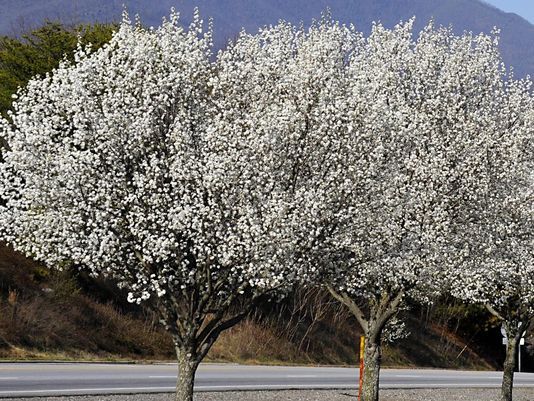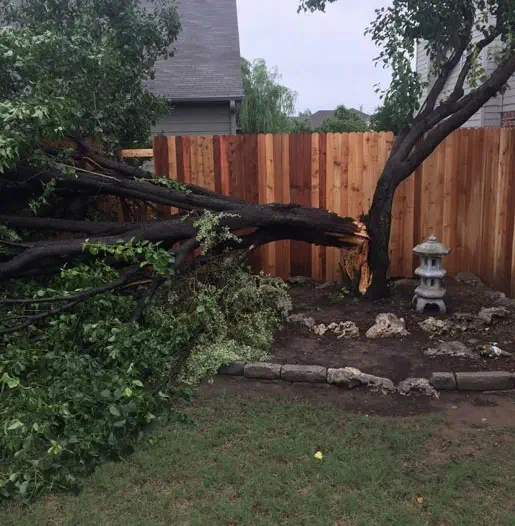BEWARE OF THE BRADFORD PEAR
A sure sign of spring is the snowy white blooms on Bradford Pears. For years, the Bradford Pear has been an iconic Southern tree, but now, it may be the most despised.
RAPID REPRODUCTION OF THE BRADFORD PEAR
The Bradford Pear was introduced as an ornamental tree in 1964 by the U.S. Department of Agriculture. Initially, it was thought that the trees were sterile. Since that time, we have found out that they are not. Though the trees do not reproduce among themselves, they cross-pollinate with other Pear varieties. This cross-pollination is causing an environmental disaster. The proliferation of Bradford Pears is occurring at such an extreme rate that Bradford Pears are actually taking over native species and resulting in genetic damage to other types of trees. The trees have started popping up in places they shouldn’t, like farmlands or under power lines. In Oklahoma, it is not uncommon to see Bradford Pears sprouting up in clumps along fence lines and in fields. The rapid reproduction of Bradford Pears has led some states to list it as an invasive pest. The Oklahoma Invasive Plant Council has placed it on its watchlist for invasive species.
WEAK STRUCTURE OF THE BRADFORD PEAR
Bradford Pears can grow into a beautiful shape . . . until the next gust of wind. Though these trees can be visually appealing, they are structurally very weak. The steep V crotch branch structure causes limbs to crack and split easily and they are notorious for having limbs split away from the main trunk. They are especially susceptible to ice and wind. Bradford Pears only have a lifespan of approximately 20 years, but most of them do not make it that long because it is highly likely that they will break or fall before then. The trees are so prone to breakage that the U.S. National Arboretum removed the Bradford Pears that once lined its parking lot to avoid further damage to vehicles. Municipal tree departments have also turned against the tree because of its tendency to break onto sidewalks and powerlines.

Bradford Pears in bloom.

This Bradford Pear was split in half due to wind.
OTHER ISSUES OF THE BRADFORD PEAR
Bradford Pears are smelly trees. The blooms produce a rather unappealing smell that some have described as fishy. It is also difficult to grow grass underneath these trees as the dense branches produce dense shade. Many yards have been overtaken by these trees as they have grown to more than twice their anticipated size. Lastly, Bradford Pears are especially susceptible to a disease called fire blight. Fire blight will cause leaves to blacken and curl and cankers to form on the bark and if left untreated, will eventually kill the tree.
Due to the problems associated with Bradford Pears, there are numerous campaigns across the country encouraging people to cut them down. The city of Pittsburg has even gone so far as to ban them completely. Bradford Pears can be a beautiful addition to landscape, but it is important to beware of what is known as “The Curse of the Bradford Pear.” If you have a Bradford Pear, regular maintenance can help prevent splitting. Tree trimming can help distribute the weight more evenly to decrease the chance of breakage or damage. If a Bradford Pear is removed, the stump and roots should be ground out. Otherwise, the tree will regenerate quickly.
CONTACT A TULSA CERTIFIED ARBORIST
Contact us today to have Jake, our ISA Certified Arborist, prune or remove your Bradford Pear. We are fully insured for both liability and workers’ compensation and have over a decade of experience in the Tulsa tree care industry. Call or text us at 918-500-9955 and don’t forget to check us out on Facebook, Instagram, and Twitter!
Contact Your
Tulsa Tree Service
TREES BY JAKE has been providing tree removal services in Tulsa for over a decade. Jake is a Tulsa Certified Arborist and we have a variety of equipment to safely and efficiently remove trees. Call or text us today for your free estimate at 918-500-9955 and don’t forget to check us out on Facebook, Instagram, and Twitter!